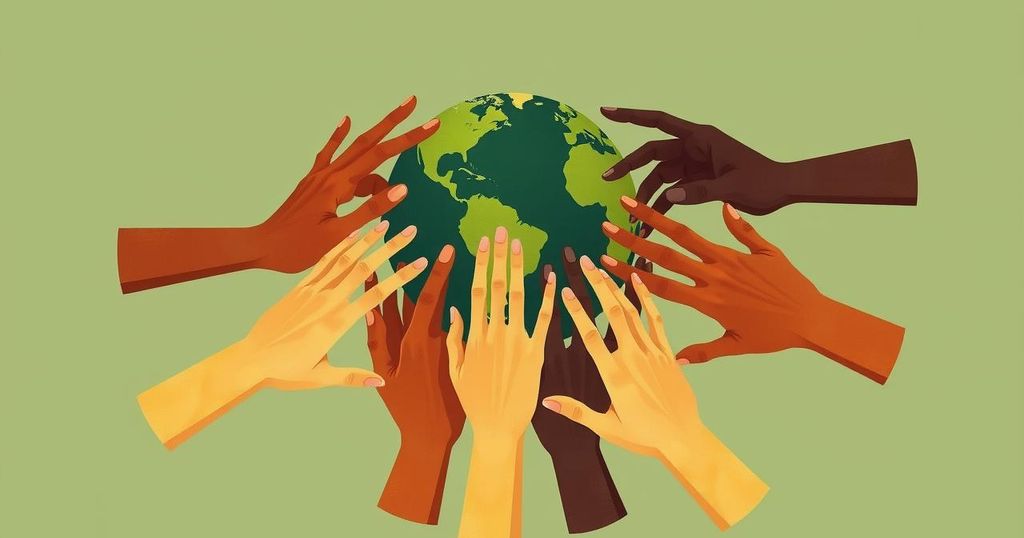The Urgency of Supporting Sudan’s ICJ Case Against the UAE

The article discusses Sudan’s ICJ case against the UAE, alleging its complicity in genocide through support for the Rapid Support Forces (RSF). With up to 15,000 civilians dead and over 500,000 displaced, Sudan’s claims reflect broader humanitarian crises in postcolonial nations. Support from the Global South is crucial to maintain international solidarity and accountability amidst concerns over the UAE’s influence and actions.
The International Court of Justice (ICJ) announced on March 6 that Sudan has initiated proceedings against the United Arab Emirates, alleging its complicity in genocide. This action arises from the UAE’s continued support of the Rapid Support Forces (RSF), a paramilitary group engaged in an ongoing violent power struggle against the Sudanese Armed Forces (SAF) since April 2023, which Sudan claims constitutes a war crime.
Sudan has cited extensive atrocities committed by the RSF against the Masalit community, with reports indicating that between May and June 2023, up to 15,000 Masalit civilians were killed in West Darfur and over 500,000 were displaced into Chad. This situation mirrors the earlier Darfur conflict of the 2000s, where similar acts were perpetrated by the Janjaweed militias, predecessors of the RSF.
The accusations against the UAE extend beyond mere allegations, as Sudan claims it has evidence of the violation of the Genocide Convention by enabling the RSF’s actions. Forensic reports from respected organizations, including the Raoul Wallenberg Centre for Human Rights, outline systematic killings, sexual violence, and the destruction of entire villages. Satellite imagery from Yale University’s Humanitarian Research Lab has corroborated the destruction of civilian infrastructure.
Furthermore, UN reports have uncovered mass graves resulting from RSF assaults. Eyewitness testimonies reveal that RSF fighters explicitly targeted the Masalit due to their ethnicity, showcasing a genocidal intent confirmed by the U.S. State Department’s classification of RSF actions as genocide, despite initial delays in this recognition from the Biden administration.
The UAE’s involvement in the conflict is substantiated by findings from the U.N. Security Council’s Panel of Experts, which referenced evidence of UAE arms supplies to the RSF from its base in Chad. Flight tracking data has shown numerous transfers of weapons from the UAE, and revelations from a New York Times investigation highlighted clandestine drone operations supporting the RSF, compounding the humanitarian crisis.
The UAE’s status as a regional power complicates Sudan’s case. With a robust economy significantly larger than Sudan’s and extensive diplomatic relations, the UAE is able to exert considerable influence. U.S. legislators have signaled the UAE’s failure to cease support for the RSF, which has led to increased fatalities among civilians.
The impending battle for justice illustrates a fragile international legal landscape. The support demonstrated by several Global South nations for South Africa’s ICJ case against Israel displays potential for solidarity. Nations such as Algeria, Brazil, and Pakistan have shown strong backing, amplifying South Africa’s legacy of anti-colonial resistance.
However, Sudan’s predicament lacks similar historical advantages. The ongoing crises reflect broader issues faced by postcolonial states, including exploitation from both domestic factions and foreign interests. The humanitarian fallout, characterized by grievous suffering and institutional collapse, underscores the necessity for international attention.
Failure to support Sudan’s case against the UAE could fracture the Global South’s solidarity and undermine justice principles, allowing great powers to manipulate international law. However, it is crucial to distinguish this support from an endorsement of the Sudanese government amid its conflict with the RSF, which has a tarnished record of civilian casualties.
While supporting Sudan’s legal stance, it is vital to focus on the ethical implications of the UAE’s involvement and its overarching influence in the region. Unchecked, these actions pose a considerable threat to sovereign states across the Global South, exacerbating struggles for autonomy and resource management.
The stakes for the international justice framework are undeniably high, with a ruling in favor of Sudan potentially restoring confidence in the ICJ’s effectiveness. Yet, such progress requires unified backing reminiscent of the support shown toward South Africa’s recent attempts at justice.
The UAE may attempt to evade accountability through legal reservations, but scholars contend that such exemptions distort the Genocide Convention’s core principles. The ICJ’s 1951 advisory opinion indicated that treaty reservations incompatible with a treaty’s goals cannot be accepted, reinforcing the need for accountability in cases of genocide.
In conclusion, neglecting Sudan’s pleas for justice risks a void that stronger powers could exploit for their own benefits, while rendering the Sudanese populace collateral damage in a larger geopolitical struggle. Thus, it becomes imperative for the nations of the Global South to lend their voices in favor of Sudan’s rightful demand for justice.
In summary, Sudan’s ICJ case against the UAE underscores vital principles of international accountability and justice. As the situation reflects a broader narrative of exploitation faced by postcolonial states, the support for Sudan’s initiative is integral to uphold the ideals of global solidarity. A failure to act could not only detrimentally affect Sudan but also set a concerning precedent for the application of international law on a global scale, allowing powerful States to escape responsibility.
Original Source: foreignpolicy.com








